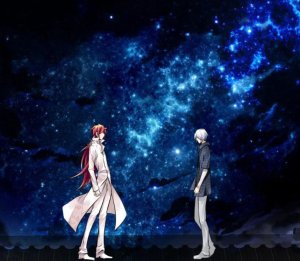Cette critique peut contenir des spoilers
What value is human life ...
WOW. This turned out to be a very poignant and moving story for me. Given the existing ratings it got on MDL, I didn't think it would affect me the way it did, I was deeply moved by it and have nothing bad to say ... it is brilliant on many levels. It had me pausing in reflection many times and is indeed as the closing song says, "Scenes from a family, which could be anywhere" ... even mine, thousands of kilometers away in another country, another culture, another family, another time.
The movie is based on the true story of Hashimoto Kouji, who is a screenwriter and broadcaster in Japan. He used to work in a cash truck and in 2001 he opened up a comedy theatre called "Lumine the Yoshimoto". It was here that he became a theater seated writer and later a screen and broadcast writer. "Blank 13", is his story about his father who went missing for 13 years. When they 'found' him thirteen years later, he only had a few months left to live. Hashimoto's life is portrayed by Takahashi Issei in the role of Matsuda Koji.
From what I can gather, this movie was Saito Takumi's directorial debut, and, in my opinion, he nailed it beautifully. Saito has an eye for the profound and subtle ... he quietly captured so much of the nuances and complexities of human existence ... each scene was loaded and yet flowed so effortlessly from one to the other. The sets; the lighting (in some scenes the lighting was like the chiaroscuro effect used in a Rembrandt or a Vermeer painting); the flashbacks; the beautiful music which flowed like a stream helping you to move along as the story progressed; the actors ... all perfectly portray the sadness, the struggle and the melancholy of ruined lives ... the stunned disbelief at what it was that others valued the deceased for, the latent resentment and sadness of the remaining family members and their pain at never having 'what could have been' ... all contrasted at the end by the little life that was yet to be born. It is a masterpiece of portrayal.
The title, "Blank 13", refers to the 13 years of Matsuda Masato's life that was a 'blank' to his former wife and sons ... though I personally think Matsuda Masato's life was probably to one degree or another, 'blank' even when he was with them. However, the story is really about the effect on the family when they learn about what those 13 missing years meant to the people who were in attendance at his funeral. On the one hand, it was pathetically comical, while on the other hand it was a stinging slap of pain, betrayal and hypocrisy, all laced with a profound sense of disbelief. To find out that their father was admired for his magic trick of turning paper into a baseball, respected for his collection of porn centerfolds; appreciated for the money he provided for 500,000 yen buddha beads for a fellow in trouble and for the medical expenses of his roommate's mother ... smh ... there is really no coming back from that ... even the letter Matsuda Masato wrote and sent to some person to read it out at his funeral in return for 5 out of 6 platinum teeth that were in his head ... it was hollow, just meaningless sounds coming out of a stranger's mouth ... Matsuda Masato was nothing less than despicable.
Yoshiyuki's words at his father's funeral were totally understandable - "I never found a way to like this man ... I tried to forget ... mother was put through great hardship ... I hated him to death and yet listening to what everyone said ... "
Koji's following up on Yoshiyuki's words, saying it was nice to know (belatedly) that his father was the kind of person who practiced magic; the kind of person who helped people in trouble when he was broke himself; the kind of man to hold on to Koji's composition that won a prize; the kind of man who sung the song "Atonement" ... so heartbreaking ... things that Koji wanted from his father but never got. Koji goes on to say that he also despised his father but after hearing from all the mourners, he felt like he might like him a little ... but he is conflicted and finally says that he actually may feel like he might be sad. It is sad ... so terribly heartbreaking and tragic ... if it was me, I would have left like Yoshiyuki (in fact in real life I did).
What value is a human life ... is it is the number of attendees at their funeral ... is it their legacy ... does the 'value' come from being present in someone's life or does it come from being absent ... or maybe it is both? One thing for sure, the value of someone's life definitely doesn't come from how many people attend their funeral. As for their legacy ... present or in absentia ... who knows what the knock-on effect of that is across the myriads of lives that have directly or indirectly been 'touched' by that person ... it will be different things to different people at different times ... and so maybe in the big scheme of things, there is value to all existence ... who knows.
Finally, after all is said (and not said) and done, Matsuda Masato's body is relegated to the crematory fire and is turned into smoke and ashes. A Shakespearean end in a way ... life going up in smoke, full of sound and fury, signifying nothing. BUT ... from ashes, new life can spring forth. Koji is like the ashes of Matsuda Masato's legacy ... and from that he and his girlfriend have spawned new life ... hope they did/do a better job than his father Matsuda Masato.
A masterpiece.
The movie is based on the true story of Hashimoto Kouji, who is a screenwriter and broadcaster in Japan. He used to work in a cash truck and in 2001 he opened up a comedy theatre called "Lumine the Yoshimoto". It was here that he became a theater seated writer and later a screen and broadcast writer. "Blank 13", is his story about his father who went missing for 13 years. When they 'found' him thirteen years later, he only had a few months left to live. Hashimoto's life is portrayed by Takahashi Issei in the role of Matsuda Koji.
From what I can gather, this movie was Saito Takumi's directorial debut, and, in my opinion, he nailed it beautifully. Saito has an eye for the profound and subtle ... he quietly captured so much of the nuances and complexities of human existence ... each scene was loaded and yet flowed so effortlessly from one to the other. The sets; the lighting (in some scenes the lighting was like the chiaroscuro effect used in a Rembrandt or a Vermeer painting); the flashbacks; the beautiful music which flowed like a stream helping you to move along as the story progressed; the actors ... all perfectly portray the sadness, the struggle and the melancholy of ruined lives ... the stunned disbelief at what it was that others valued the deceased for, the latent resentment and sadness of the remaining family members and their pain at never having 'what could have been' ... all contrasted at the end by the little life that was yet to be born. It is a masterpiece of portrayal.
The title, "Blank 13", refers to the 13 years of Matsuda Masato's life that was a 'blank' to his former wife and sons ... though I personally think Matsuda Masato's life was probably to one degree or another, 'blank' even when he was with them. However, the story is really about the effect on the family when they learn about what those 13 missing years meant to the people who were in attendance at his funeral. On the one hand, it was pathetically comical, while on the other hand it was a stinging slap of pain, betrayal and hypocrisy, all laced with a profound sense of disbelief. To find out that their father was admired for his magic trick of turning paper into a baseball, respected for his collection of porn centerfolds; appreciated for the money he provided for 500,000 yen buddha beads for a fellow in trouble and for the medical expenses of his roommate's mother ... smh ... there is really no coming back from that ... even the letter Matsuda Masato wrote and sent to some person to read it out at his funeral in return for 5 out of 6 platinum teeth that were in his head ... it was hollow, just meaningless sounds coming out of a stranger's mouth ... Matsuda Masato was nothing less than despicable.
Yoshiyuki's words at his father's funeral were totally understandable - "I never found a way to like this man ... I tried to forget ... mother was put through great hardship ... I hated him to death and yet listening to what everyone said ... "
Koji's following up on Yoshiyuki's words, saying it was nice to know (belatedly) that his father was the kind of person who practiced magic; the kind of person who helped people in trouble when he was broke himself; the kind of man to hold on to Koji's composition that won a prize; the kind of man who sung the song "Atonement" ... so heartbreaking ... things that Koji wanted from his father but never got. Koji goes on to say that he also despised his father but after hearing from all the mourners, he felt like he might like him a little ... but he is conflicted and finally says that he actually may feel like he might be sad. It is sad ... so terribly heartbreaking and tragic ... if it was me, I would have left like Yoshiyuki (in fact in real life I did).
What value is a human life ... is it is the number of attendees at their funeral ... is it their legacy ... does the 'value' come from being present in someone's life or does it come from being absent ... or maybe it is both? One thing for sure, the value of someone's life definitely doesn't come from how many people attend their funeral. As for their legacy ... present or in absentia ... who knows what the knock-on effect of that is across the myriads of lives that have directly or indirectly been 'touched' by that person ... it will be different things to different people at different times ... and so maybe in the big scheme of things, there is value to all existence ... who knows.
Finally, after all is said (and not said) and done, Matsuda Masato's body is relegated to the crematory fire and is turned into smoke and ashes. A Shakespearean end in a way ... life going up in smoke, full of sound and fury, signifying nothing. BUT ... from ashes, new life can spring forth. Koji is like the ashes of Matsuda Masato's legacy ... and from that he and his girlfriend have spawned new life ... hope they did/do a better job than his father Matsuda Masato.
A masterpiece.
Cet avis était-il utile?






